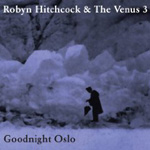|
|
 |
Dusted Reviews
Artist: Robyn Hitchcock and the Venus 3 Album: Goodnight Oslo Label: Yep Roc Review date: Feb. 18, 2009 |

|
|
|
 |
Eighty-five percent of self-described music lovers have no idea what their favorite songs are about. That’s because 27 percent of songs aren’t about anything (e.g., “Kiss From a Rose,” “Crank Dat”) (actually, those aren’t the best examples, since they might both be about bukkake), and 58 percent of people don’t pay much attention to lyrics. This explains why Tom Petty can be written off as a safe-playing Dylan wannabe while two-thirds of his oeuvre dwells on depression, suicide and domestic violence. All of these stats are bullshit, but since critical thinking seems more and more like a luxury, I trust that I can slip them under the radar.
An immersion in the work of Robyn Hitchcock relies on several variables. The Hitchcock fan must have an acute fascination with lyrics. Particularly now, when he’s putting out the least aurally edgy records of his career. You’re not going to love Goodnight Oslo for its compositional nerve or its slick production, unless you’ve heard every Hitchcock record and your favorite is Perspex Island, which it isn’t. (A probability approaching a certainty.) The Venus 3 aren’t even as weird as the Egyptians, and this album has no relation to Hitchcock’s solo work, whether it be his surreal I Often Dream of Trains peak or the provocative grit of his misunderstood 1996 triumph Moss Elixir. Goodnight Oslo is good-natured jangle-pop seasoned with brass and handclaps. That’s what it’s going for.
But it’s a perfect delivery mechanism for Hitchcock’s arch, melancholy sense of humor. Dark satire is powerful indeed when it’s disguised as eager-to-please entertainment. (Ask Elvis Costello, Morrissey, et al.) His Zen-riddle social commentary is in full effect on “Your Head Here” and the Southwestern-flavored “Hurry for the Sky.” (“You can easily confuse money with success / Success is always relative / Money is acute / Money’s absolute.”) Even the so-dumb-they’re-smart nursery rhymes (“What You Is”) are detailed and intriguing. But his love songs (“I’m Falling,” “Up to Our Nex,” “Intricate Thing”) have the most immediate impact. Hitchcock approaches eros with the terrified, neurotic fascination of a teenager. It’s a painful perspective, but when you lose it forever, something is lost. Hitchcock may have lost his “edge” as an artist, but he hasn’t lost that.
Another variable: Hitchcock maintains an almost Pollard-like level of productivity. When an artist creates constantly, a lot of the work is going to be fairly conventional, at least by that artist’s standards. Most rock critics treasure the long, intense relationship with objects of infinite fascination. (Think the last few Scott Walker records.) Goodnight Oslo is more like the seemingly “normal” yet slightly “off” one-night-stand, the one you don’t think about much the next week but wonder about 10 years later. Don’t expect it to enthrall on contact, but it might settle gently into the subconscious.
By Emerson Dameron
|







